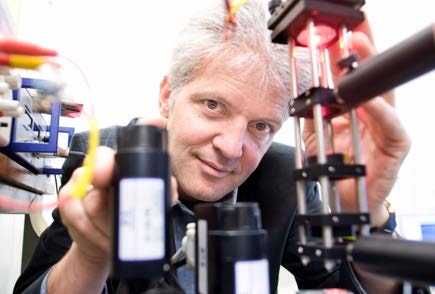Lecture 1
Nanopores for fingerprinting and sequencing individual proteins
| Speaker | Distinguished Prof Cees Dekker, Kavli Institute of Nanoscience, Delft University of Technology, The Netherlands |
| Date/Time | Wednesday, 6 Nov, 10AM |
| Location | Lecture Theatre 32 |
| Moderator | Prof Sow Chorng Haur |
Abstract
Nanopores are versatile biophysical sensors for single biomolecules. In the past decade, they even have been developed into a technology single-molecule DNA sequencing. Hence I will first present an overview of nanopore DNA sequencing:
0. DNA sequencing with nanopores
New efforts are directed towards the fingerprinting and sequencing of proteins at the single-molecule level. In this talk I will present two examples of our recent research in this direction.
1. Trapping a single protein using a nanopore electro-osmotic trap (NEOtrap).
We developed a new type of single-protein trap, which we name nanopore electro-osmotic trap (NEOtrap). Here, an origami structure is used to create a strong electroosmotic flow in a solid-state nanopore, which allows us to catch a single protein and hold it at the most sensitive region of the nanopore for label-free sensing. This allows to distinguish various proteins, as well as study the dynamics of a single protein for a long time (even hours). Orientation control and linking of the DNA origami sphere can significantly improve the NEOtrap. Recent experiments on dCas9/RNA/DNA allowfor modelling the trapping kinetics.
2. Nanopore-based sequential reading of individual peptides
We demonstrated [2] a nanopore-based single-molecule peptide reader that is capable of reliably detecting single amino-acid substitutions within individual peptides. A peptide is chemically linked to a DNA molecule and sequentially pulled through a biological nanopore by a DNA helicase in single amino-acid steps. Stepping ion-current signals enable discrimination of single-amino-acid substitutions in single reads. Notably, we demonstrated the capability to ‘rewind’ peptide reads, obtaining indefinitely many independent reads of the same molecule, yielding an undetectably low error rate in single-amino-acid variant identification.
Recently [3], we expanded this concept to discriminating post-translational modifications (PTMs). PTMs play a key role in regulating protein activity and they are the crucial elements underlying the enormous diversity in the proteome. Current mass-spectrometry detection methods cannot measure PTMs in single molecules or differentiate between closely spaced PTM sites. We demonstrated the ability to detect PTMs at the single-molecule level on immunopeptide sequences with cancer-associated phosphate variants by controllably drawing the peptide through the sensing region of a nanopore. We discriminate peptide sequences with one or two closely spaced phosphate PTMs with 95% accuracy for individual reads of single molecules. The data also prompted us to start modelling the traversal of peptides of mixed charge through nanopores. In my presentation I will present the state of the art of these experiments in our lab, which is expanding efforts to detecting a range of other PTMs and developing a workflow to read natural proteins.
These proof-of-concept experiments constitute a promising basis for the development of a single-molecule protein sequencer.
References:
[1] S. Schmid et al, Nature Nanotechn. 16, 1244 (2021); C. Wen et al, Nano Lett. 23, 3, 788 (2023)
[2] H. Brinkerhoff, A.S.W. Kang, J. Liu, A. Aksimentiev, C. Dekker, Science 374, 1509 (2021)
[3] I.C. Nova, J. Ritmejeris, H. Brinkerhoff, T.J.R. Koenig, J.H. Gundlach, C. Dekker, Nature Biotechnology, DOI 10.1038/s41587-023-01839-z (June 2023)

Biography
Cees Dekker is a physicist who moved from quantum solid-state physics to nanobiology. In the 1990s, he pioneered nanotechnology and discovered many of the exciting electronic properties of carbon nanotubes, establishing the first single-molecule transistor. In 2000, he moved to single-molecule biophysics and nanobiology, applying nanotechnology to biological systems and enforcing various breakthroughs from DNA and protein sequencing with nanopores to DNA loop extrusion by novel motor proteins. His current research focuses on nanopores, chromosome structure, and developing synthetic cells. Characteristically, Dekker pioneers new fields and defines new directions, both organizationally in e.g. establishing the Kavli Institute and a new Department of Bionanoscience at Delft and spearheading international initiatives to build synthetic cells, but more importantly also scientifically – by pioneering molecular electronics and nanobiology yielding major discoveries from nanopore sequencing to DNA loop extrusion by motor proteins.
Read more: http://ceesdekkerlab.nl
